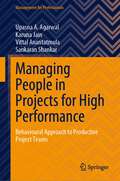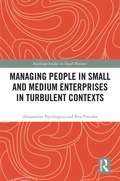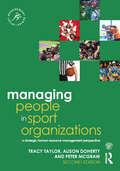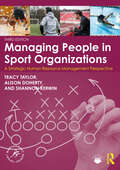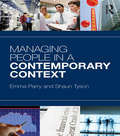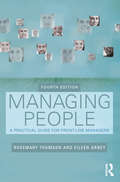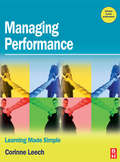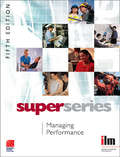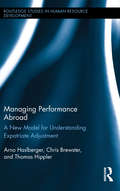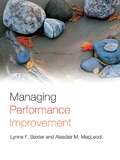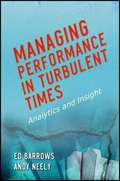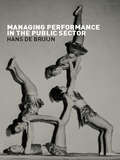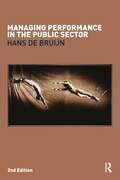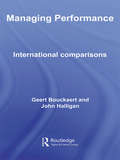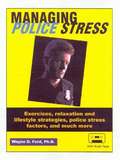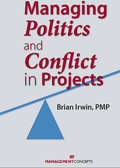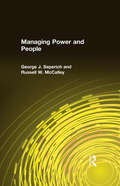- Table View
- List View
Managing People in Commercial Kitchens: A Contemporary Approach (Routledge Focus on Tourism and Hospitality)
by John Cooper Charalampos Giousmpasoglou Evangelia Marinakou Anastasios ZopiatisManaging People in Commercial Kitchens: A Contemporary Approach uses original research to argue that senior managers (head chefs) should differentiate their people management practices in kitchen brigades from those used in the hospitality industry more generally (induction, socialisation, and performance evaluation) due to the group’s strong occupational identity and culture. The understanding of chefs’ work from a management perspective is critical for successful hospitality operations but has been historically under-researched. Chapters provide a detailed account of chefs’ work in commercial kitchens from an HRM perspective. Using occupational identity and culture as a vehicle, this book explores the different aspects of managerial work in commercial kitchen settings: general management, leadership, education and training, skills and competencies, managing deviant behaviour, managing stress, and managing diversity (focused on gender segregation). The final chapter looks at future perspectives on this unique working environment and the many challenges arising from the latest developments such as the COVID-19 pandemic. Providing both theoretical insights and practical applications with the use of case studies throughout, this will be of great interest to upper-level students and researchers in hospitality, as well as a useful reference for current managers in the field.
Managing People in Projects for High Performance: Behavioural Approach to Productive Project Teams (Management for Professionals)
by Upasna A. Agarwal Karuna Jain Vittal Anantatmula Sankaran ShankarThis book examines practically useful management and people skills, and looks at competencies from the micro, meso, and macro- lens. At the micro- level, the book examines a range of competencies needed for managing oneself and others in a project environment, such as personality style, cognitive skills, communication skills, and emotional intelligence. The book will also includes discussion on strategies for managing emotions of self and others effectively. At the meso- level, the book discusses basic structure, characteristics, and importance of different types of teams such as virtual teams, project teams, domain specific teams, and heavy-weight teams in organizations to enhance productivity and delegate accountability. It also explores team processes, including structure, culture, supporting systems, performance and incentive systems, and their impact on team productivity. In addition, the book includes a discourse on skills to manage a multi-generational workforce (a combination of baby boomers, X and Y generation), a challenge faced by project managers in current scenario. Finally, at the macro- level, the book captures the role of culture in a project context; emerging leadership styles in projects, maintaining relationship with internal and external stakeholders; role of power, politics and influence in relationship building (social networks and social capital); and managing conflicts and negotiations. The book presents ethical considerations in managing projects; relationship between projects and sustainability; societal responsibilities of projects; advantages and disadvantages of forms of control in projects (behaviour and outcome control). It is positioned primarily for practitioners although it is a relevant and useful resource and reference for academics and students of project management and management studies courses.
Managing People in Small and Medium Enterprises in Turbulent Contexts (Routledge Studies in Small Business)
by Alexandros Psychogios Rea ProuskaManaging People in Small and Medium Enterprises in Turbulent Contexts explores a range of human resource management (HRM) issues specific to small and medium-sized enterprises (SMEs). Based on a series of research studies and secondary sources of data, the book’s primary aim is to contextualise HRM issues in SMEs operating in a variety of national economic contexts that are (or have recently experienced) a turbulent situation. SMEs are the backbone of these economies. It is therefore critical that we study HR practices and concepts within such enterprises. The book covers HR practices in SMEs, such as recruitment and selection, training and development, performance evaluation and employee relations, by focusing on three types of turbulent economies: emerging market economies in Asia, the Pacific, Africa and Latin America; transition economies of Central and Eastern Europe; and crisis contexts in Southern Europe. Managing People in Small and Medium Enterprises in Turbulent Contexts is a useful resource for organisations, practitioners, academics and scholars in the fields of HRM, employee engagement, small and medium business management and other related disciplines.
Managing People in Sport Organizations: A Strategic Human Resource Management Perspective (Sport Management Series)
by Tracy Taylor Alison Doherty Peter McGrawManaging People in Sport Organizations provides a comprehensive overview of the theory and practice of managing people within a strategic framework. This revised and updated second edition examines a range of strategic human resource management approaches that can be used by sport organizations to respond to contemporary challenges and to develop a sustainable performance culture. Drawing on well-established conceptual frameworks and current empirical research, the book systematically covers every key area of HRM theory and practice, including: recruitment training and development performance management and appraisal motivation and reward organizational culture employee relations diversity managing change This new edition also includes expanded coverage of social media, volunteers, and individuals within organizations, and is supported with a new companion website carrying additional resources for students and instructors, including PowerPoint slides, exam questions and useful web links. No other book offers such an up-to-date introduction to core concepts and key professional skills in HRM in sport, and therefore?Managing People in Sport Organizations?is essential reading for any sport management student or any HR professional working in sport.
Managing People in Sport Organizations: A Strategic Human Resource Management Perspective (Sport Management Series)
by Tracy Taylor Alison Doherty Shannon KerwinNow in a fully revised and updated third edition, Managing People in Sport Organizations outlines the theory and practice of managing people within a strategic framework.A complete textbook for any human resource management (HRM) in sport course, it explains how sport managers can get the best out of their teams and organizations, develop their professional skills, and create a sustainable performance culture. Structured around the functional flow of HRM practice – from recruitment to rewards – the book introduces every key area of people management, including strategy, planning, training, performance management, and managing change. This new edition includes expanded coverage of topics such as e-HRM and post-COVID workplaces. There is also a new foundational chapter focused on the individual in the organization that sets the context for their effective management.With international cases, examples, and data included in every chapter, this is essential reading for any sport management student or HR professional working in sport.
Managing People in a Contemporary Context
by Shaun Tyson Emma ParryThe worldwide financial crash and the ensuing recession have coincided with other significant long term changes for the Western Economies of Europe and the USA, especially the growing strength of newly developed economies, demographic and technological change, institutional crises and political uncertainty. The interconnected nature of businesses and societies mean the competitive landscape is being transformed, and new economic pressures and opportunities are producing new business models, a rebalancing of economies, and a new HRM. The application of new technology to the processes and systems of people management is spreading, in a world where competitive advantage is increasingly about how smart the management processes are, and how well people are managed. This text is the first book to analyse the way these contextual pressures are producing a game change in the human resource function of management. For anyone who has an HR role or is a line manager, or a student of management, and for those who teach, research or consult in the field, this book encapsulates these critically important trends and what they mean for managing people in the 21st Century.
Managing People in a Downturn
by Adrian FurnhamA collection of engaging and thought-provoking essays looking at the world of business and management during a recession. Furnham takes a sideways look at some business issues that are often brushed under the carpet and examines recent academic contributions to business literature in an amusing and jargon-free style.
Managing People in the Hospitality Industry (Hospitality Essentials Series)
by Michael RileyThis is a book about being a successful manager in the complex hospitality industry. Approaching the subject in the context of personal development, it offers future managers essential knowledge and insight into the opportunities, the constraints, the problems and the solutions that face management at any level in the industry. Structured in six parts, this comprehensive volume is not merely concerned with the social and psychological aspects of people management, but also with the economics of labour, including: labour costs, utilisation, labour market behaviour and pay. These aspects are conjoined in the book with the skills of people management to reflect the dynamics of real-life practice. Combining theory and practice, Managing People in the Hospitality Industry offers a concise portrait of the industry at work and is essential reading for the hospitality managers of tomorrow.
Managing People in the Hybrid Workplace
by Kay Maddox-DainesManaging People Effectively in a Hybrid Workplace is designed to ensure that both aspiring and experienced people professionals are equipped with in-depth knowledge of how workplace structures are being disrupted by new technology and working models. It explores analytics and capability to provide evidence-based insights that can shape employee experiences, support adaptation to changing business conditions, navigate risk, drive workplace performance, harness collaboration and open up new possibilities for HR and the organisation. The book has been designed both as a text to support students studying HRM on university programmes and as a handbook for professionals wishing to update their knowledge in contemporary HRM. The book also supports the core and specialist knowledge and core behaviours in the CIPD Profession Map.
Managing People: A Practical Guide for Front-line Managers (Institute Of Management Ser.)
by Andrew Thomson Eileen Arney Rosemary ThomsonThis updated and exciting fourth edition of Managing People: A Practical Guide for Front-Line Managers addresses the growing needs of front-line managers who are not themselves specialists in personnel management but whose roles require them to have these skills. A growing trend over the last two decades has given these managers an increasing amount of responsibility of direct line management, which can be extremely challenging especially if the correct training is not given. This book examines how the different parts of managing people fit together, whilst acknowledging that different contexts require different approaches and recognizing ongoing organizational, environmental and legal changes that affect the employment framework. It recognizes the rapidly changing context in which modern front-line managers have to operate and acknowledges the increasing expectations of good leadership as a necessity. However, the book also emphasizes the need for front-line managers to understand themselves, their own management styles and attitudes, together with the importance of empathy in appreciating the perspectives of the staff that work under them. Managing People: A Practical Guide for Front-Line Managers is designed for both new managers and for NVQ/SVQ Level 4 students. It is also appropriate for the first stages of Foundation Degrees and for HND courses combining academic study with workplace learning.
Managing People: Holistic Engagement of Employees-And How Your Company Can Profit by India's Example
by Michael Useem Peter Cappelli Harbir Singh Jitendra V. SinghLeading firms in India-IT services giant HCL Technologies, Reliance Industries, Yes Bank, and Infosys, to name just a few-view managing people as an integral part of their business strategies. The India Way, which stands in striking contrast to the business practices of Western countries, recognizes that strategy is based on internal competencies, and these ultimately come from the actions and efforts of employees. In this chapter, authors Peter Cappelli, Harbir Singh, Jitendra Singh, and Michael Useem examine key aspects of human resource management at Indian firms-recruitment, training and development, employee engagement, and organizational culture-positioning them in stark contrast to their counterparts in U.S. firms. What can Western business leaders learn from the India Way of managing people? A great deal, according to the authors. This chapter was originally published as Chapter 3 of The India Way: How India's Top Business Leaders Are Revolutionizing Management.
Managing People: Holistic Engagement of Employees-And How Your Company Can Profit by India's Example
by Michael Useem Peter Cappelli Harbir Singh Jitendra V. SinghLeading firms in India-IT services giant HCL Technologies, Reliance Industries, Yes Bank, and Infosys, to name just a few-view managing people as an integral part of their business strategies. The India Way, which stands in striking contrast to the business practices of Western countries, recognizes that strategy is based on internal competencies, and these ultimately come from the actions and efforts of employees. In this chapter, authors Peter Cappelli, Harbir Singh, Jitendra Singh, and Michael Useem examine key aspects of human resource management at Indian firms-recruitment, training and development, employee engagement, and organizational culture-positioning them in stark contrast to their counterparts in U.S. firms. What can Western business leaders learn from the India Way of managing people? A great deal, according to the authors. This chapter was originally published as Chapter 3 of The India Way: How India's Top Business Leaders Are Revolutionizing Management.
Managing Performance
by Corinne LeechLearning Made Simple books give you skills without frills. They are matched to the main qualifications and written by experienced teachers and authors to make often tricky subjects simple to learn. Every book is designed carefully to provide bite-sized lessons matched to readers' needs.Using full colour thoughout and written by leading teachers and writers, Learning Made Simple books build on a rich legacy of over 50 years as leading publishers helping to learn new skills and develop their talents.Whether studying at college, training at work, or reading at home, aiming for a qualification or simply getting up to speed, Learning Made Simple Books will give readers the advantage of easy, well-organized training materials in a handy volume you can refer to again and again. These titles will be promoted direct to training companies and learners, and individuals will be urged to buy them not only by college lecturers but also by trainers at work. These titles will be core stock for years to come.The books are written by experienced HR trainers and will be typeset by PK McBride (an experienced teacher and author of several Learning Made Simples himself). PK McBride has a thorough understanding of the ethos of the LMSs books and his involvement will insure that all titles have a layout and style consistent with the brand.
Managing Performance
by John J. Gabarro Linda A. HillEncourages managers to think critically about how to prepare for and give a performance appraisal interview. Presents frameworks for evaluating subordinates' work and suggestions for coaching them.
Managing Performance (Institute of Learning & Management Super Series)
by Institute of Leadership & ManagementSuper series are a set of workbooks to accompany the flexible learning programme specifically designed and developed by the Institute of Leadership & Management (ILM) to support their Level 3 Certificate in First Line Management. The learning content is also closely aligned to the Level 3 S/NVQ in Management. The series consists of 35 workbooks. Each book will map on to a course unit (35 books/units).
Managing Performance Abroad: A New Model for Understanding Expatriate Adjustment (Routledge Studies in Human Resource Development)
by Thomas Hippler Arno Haslberger Chris BrewsterIn a global economy full of multinational firms, international human resource management (including expatriation, career management, and talent management) is a growing topic in the business and management literature and in universities. A thorough understanding of the adjustment of expatriates to their new environment is critical not only for selection and preparation of potential expatriates, but also for the management of expatriate performance. Managed well, expatriates can be key contributors to organizational success while abroad and even after repatriation. Poor understanding and management of expatriate issues, on the other hand, may lead to underperformance and increased turnover of expatriates and repatriates. Managing Performance Abroad summarizes and extends what is known about the topic of expatriate management and adjustment, covering all the major authors and presenting a new approach to the adjustment process. At present, expatriate adjustment is only covered as a chapter in books on international HRM and HRD. Much of this literature relies on outdated concepts and evidence. Furthermore, most business research and management publications use an expatriate adjustment model that was originally published about two decades ago. This book is the first dedicated solely to the subject of expatriate adjustment, enabling readers to formulate research questions and hypotheses and to develop expatriation policies and support systems that optimize the performance of expatriates. It presents a re-formulation of the model underlying management research about expatriate adjustment, providing guidance for researchers and practitioners alike.
Managing Performance Improvement
by Lynne F. Baxter Alasdair M. MacLeodFrom TQM to Six Sigma and the Balanced Scorecard, there appears to be no end to the 'revolutionary' approaches proposed to improve business performance. However, on closer inspection, most new performance improvement approaches offer few differences from their predecessors.This thought-provoking book provides a critical perspective on the managemen
Managing Performance in Turbulent Times
by Ed Barrows Andy NeelyStraightforward playbook for executing world-class strategy for tangible resultsDesigned with three key ideas: leverage the tools that are working, simplify the model, and make the content readable for managers, Managing Performance in Turbulent Times is a road map for the modern strategy manager. Through their simplified execution process the authors--performance management experts--show executives how to get results and execute even in the most difficult conditions.Addresses importance of adaptability to change within today's business environmentExplores the environmental turbulence that constantly confounds virtually all organizational systems, with workable solutionsProvides a streamlined execution process any organization can use to improve business resultsManagers need tools to do their jobs better. Filled with proven solutions, this book reveals how to get results through successful strategy execution, presenting a process that will help your organization execute strategy in a simplified, efficient manner.
Managing Performance in the Public Sector
by Hans De BruijnTopical and taking a bold stance in the contentious debate surrounding performance in the public sector, this new edition shows readers how performance thinking has a substantial impact on the management of public organizations. Thoroughly revised and updated, this highly successful text, written by an experienced academic and practitioner is packed full with a wealth of new features. These include: more examples and cases, from a variety of different sectors, including, hospitals, courts, school and universities a whole new chapter on the dynamics of performance management; answering the questions – how do PM systems evolve? Which effects will dominate in the long run? many extra recommendations for making PM attractive for managers. An informed and up-to-date analysis of this subject, this is an essential text for all those studying, both at undergraduate and postgraduate level, performance management in the public sector.
Managing Performance in the Public Sector
by Hans De BruijnTopical and taking a bold stance in the contentious debate surrounding performance in the public sector, this new edition shows readers how performance thinking has a substantial impact on the management of public organizations. Thoroughly revised and updated, this highly successful text, written by an experienced academic and practitioner is packed full with a wealth of new features. These include: more examples and cases, from a variety of different sectors, including, hospitals, courts, school and universities a whole new chapter on the dynamics of performance management; answering the questions – how do PM systems evolve? Which effects will dominate in the long run? many extra recommendations for making PM attractive for managers. An informed and up-to-date analysis of this subject, this is an essential text for all those studying, both at undergraduate and postgraduate level, performance management in the public sector.
Managing Performance: International Comparisons
by John Halligan Geert BouckaertIn recent years, concerns over the effectiveness of public administration have encouraged the widespread measurement and management of ‘performance’. But is performance management an appropriate model for public sector organizations, and has it proved successful? Moreover, how do the principles of performance management affect how public bodies operate, and the way they relate to the wider community? In this important text, the viability of performance management in public sector organizations is systematically assessed across a number of international case studies. The book provides a framework through which models of performance management can be understood in terms of both their impact within a public sector organization, and the effects that have been seen in countries with contrasting administrational contexts. Managing Performance – International Comparisons critically examines the effects of performance management models in the public sector, and assesses their future evolution. It is an important book for all students and researchers with an interest in management, public administration and public policy.
Managing Politics and Conflict in Projects
by Brian Irwin PMP, MSMManaging Politics and Conflict in Projects is an easy-to-read, no-nonsense guide that walks you through the "soft" issues of project management, including communicating, negotiating, and influencing skills that are vital to your project success. Understand your organization's political climate and culture and ascend the corporate ladder to the next level as a project manager. Learn how to deal with political issues requiring complex organizational and interpersonal skills, using valuable review points, tips, and a fictional narrative illustrating the book's main points. •Improve and develop your leadership, interpersonal, and communications skills•Negotiate your political environment•Acknowledge and overcome challenges inherent in project management•Enhance your career by effectively utilizing politics and conflict•Recognize and interpret the barriers of communication•Be prepared to enter into a negotiation•Overcome cultural challenges
Managing Politics at Work
by Aryanne OadeDo you want to acquire the knowledge and skills to give you greater influence in political situations at work? Perhaps you want to make sense of the political behaviour you see around you. Or maybe you want to acquire a set of effective tools to help you work more productively in a political workplace. If so, this book is for you.
Managing Power and People
by George J. Seperich Russell W. McCalleyThis practical text offers management students as well as professionals a comprehensive guide to an essential management function: the use of power and authority to achieve specific objectives. Incorporating numerous case studies and examples of actual management experiences in both large and small companies, the book provides an effective approach to the use of power to manage people and projects successfully without fear of conflict. The work is based on a unique blending of management and leadership, combined to create a powerful influence on employees resulting in the "managed responses" required to reach the planned objective. Building on this principle, the authors demonstrate how managers can use the different types of power effectively in a wide variety of situations. They show how to make use of an organization's established power structure, and offer step-by-step guidance on the essential concept of FOCUS Management. Including learning objectives, case studies, and discussion questions, this text prepares students to apply what is learned directly to any working environment. An online Instructor's Manual is available for instructors who adopt the book.

